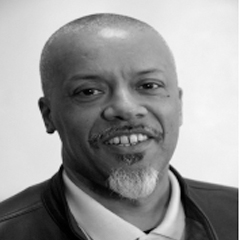
|
 |
Martin Glynn
LEICESTER WRITER
|
|
|
Profile
Martin Glynn is a writer and theatre director with an international reputation for his commissioned work in theatre, live performance, radio drama, children's books and performance poetry. His intergenerational one-act play, Kind of Blue, about the physical and emotional effects of glaucoma is featured in Ethno theatre: Research from Page to Stage, edited by Johnny Saldana (Left Coast Press, 2012). In Oct 2010, Martin was awarded a prestigious local heroes award by The Association of Jamaica Nationals in Birmingham. His poetry is featured in the Out of Bounds anthology (Bloodaxe, 2012).
Martin is a criminologist with over 25 years' experience of working in prisons and schools. He has a Cert. Ed, a Masters degree in criminal justice policy and practice and is a visiting lecturer at Birmingham City University in Youth and Crime, Victimology, Restorative Justice and Crime and the Media. In 2010 he was awarded a Winston Churchill International Travel Fellowship and so spent several weeks in the city of Baltimore and Johns Hopkins University in the United States looking at issues of fatherlessness, father hunger, and father deficit amongst young black men. In 2011, Martin facilitated ‘Colours’, a documentary video project using creative writing and music workshops to capture the experiences of young offenders in prison at HMP Wetherby and in the communities of Wakefield and Huddersfield. ‘Colours’ is a project designed to give young people the opportunity to inform and change the way practitioners and decision makers interact with them.
|
Creative Work
'Highfields Style'
De highfields style
Iz de Brixton style
Iz de Handsworth style
Iz de Moss Side Style
Where pepul a survive
An' de mind run wild.
GHETTOLOGY
Iz de name of de game
Psychological destrucshan
Inflict de pain
Dat run doun yuh life
An' tun yuh insane
Tun yuh inside out
An' empty out yuh brain
Ghettology style
Ghettology style.
It mash up yuh 'ead
destroyin evry cell
where de life yuh live
iz one pure hell
where dere's too much noize
an nasty smell
where de crime rates high
prostitushan az well
Psychological destrucshan
is lickin evry man
de life dem a live
dem nuh mek nuh plan
dem mind get unbalanced
dem dash dem inna van
guh tek dem mental hospital
go gi dem a brain scan.
PSYCHOLOGICAL DESTRUCTION
PSYCHOLOGICAL DESTRUCTION.
De concrete life
iz one rat-race
where social security pay de rent
an council gi de place
a likkle time lata
it tun inna disgrace
cause evry bit a livin'
de hustla dem a chase
de blackman run de area
a own dem corna shap
de man dem jus a hustle
to mek rent trouble stop
de woman dem a push pram
until dem legs waan drop
societie's created anotha human flop
but dem nu bizniss
Once again itz been ignored
dem push it to one side
like a cancer in we body
sumting to hide
but a likkle understandin'
is sumting to be tried
because de people in dem area
still av dem pride
if yuh feel seh dem life easy
yuh waan guh pon dem side
an wen it get ruff
yuh yeye dem open wide.
Because de Highfields style
iz de Brixton style
iz de Handsworth style
iz de Moss Side Style
iz de St Paul's style
iz de Chapeltown style
iz de St Ann's style
iTZ WHAT WE AZ GHETTO PEPUL CALL
GHETTOSTYLE!
|
Reflection
For the past three decades I have interviewed and engaged with many young people, some gang affiliated, some not, many of whom are disaffected, disillusioned, and disconnected from the social structure. I have talked to young and older men who are in the criminal justice system, ranging from those on probation to those serving sentences in prison. During my postgraduate research, I have looked critically at those factors that have pushed many of them into criminality and examined how those same men construct their own understandings of what it will takes, or would take, for them to desist from criminal behaviour. This research developed an international dimension when, in 2010, I conducted an extensive study around the impact of father absence on the city of Baltimore. My findings led me to believe that disturbances were likely to happen in Britain itself during the summer of 2011.
'Highfields Style' was written in 1985. It is timeless in the sense that it both explains and anticipates disturbances. It is a chronicle of past and of present times. In spite of Facebook, Twitter, YouTube and a whole host of other technological advances, my poem bears the test of time since the basic social structure of inequality remains unaltered: it still governs our lives.
|
Publications
Plays
Kind of Blue
Wolves and Dogs
Beyond the Mask
Mum, Where's Dad?
Yo! Blood
Fiction
Blood Bond, Franklin Watts,
Bad Brother, Franklin Watts,
The Endz, ACAF, Nottingham,
I Believe I Can Fly, Oscar, Nottingham
Tales of Uncle 'P' and Marcus, Sankofa Associates, Birmingham
Shadow People, Essays and Monologues
Father Absence Toolkit
Contact
Email: msoulfires@yahoo.co.uk
|
|
|
Writer Index
|
|